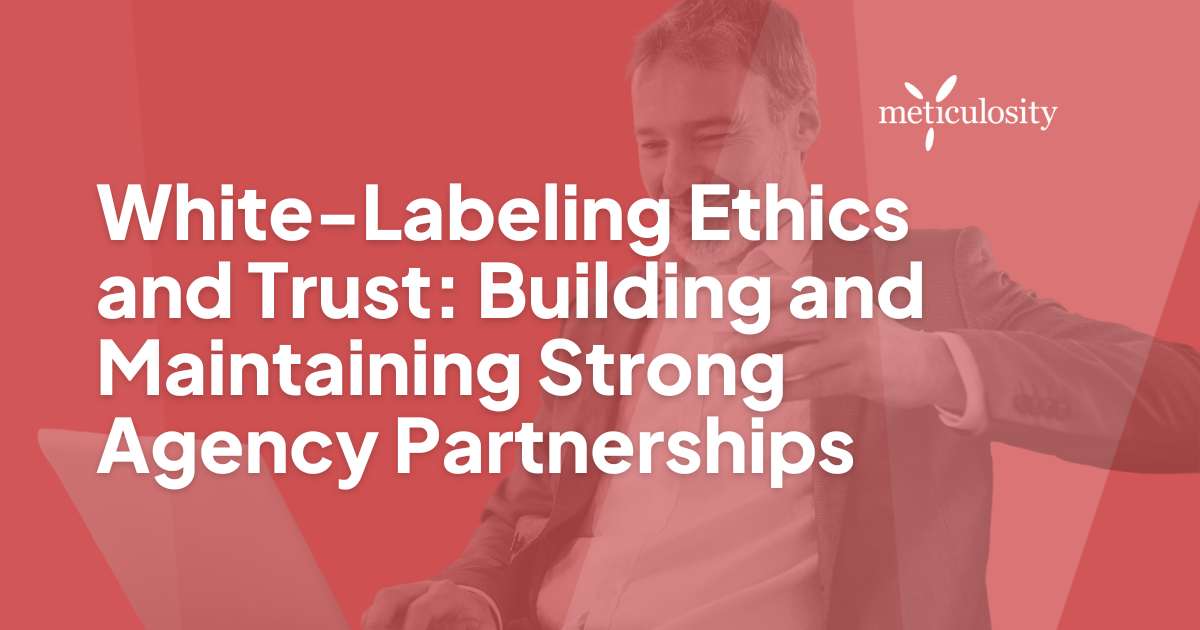Navigating the dynamic landscape of digital marketing, you strive to keep your agency's reputation spotless while broadening your array of services—a balancing act that requires grace and strategy.
As we dive deeper into this realm, we've uncovered approaches for cultivating ethical partnerships that uphold trust at every step. Together, we'll explore how to unlock these opportunities for growth and connection.
Key Takeaways
- White labeling lets agencies sell others' products as their own, which saves money and helps them grow. But keeping good quality and the right brand look can be hard.
- Partners must have the same work values, and trust is key. Always tell the truth about services to build strong relationships.
- Always talk clearly with your partners to work well together and use tools that help manage projects. Address problems fast to keep work smooth.
- Quality in every project keeps clients happy. Paying attention to detail means you do great work that clients will love.
- Keep close ties with clients by listening to what they need, being open about your work, and caring for their business success.
Defining White Labeling and Its Importance
White labeling is the practice of a company rebranding another company's product or service to make it appear as its own. It allows agencies to expand their services and offer specialized solutions without having to invest in new resources.
However, challenges in white labeling can arise when it comes to establishing trust and credibility with clients.
Benefits of White Labeling for Agencies
We know how white labeling can give agencies a big boost. It helps you grow your business in many ways.
- You can offer more services without having to be an expert in everything. White labeling lets you sell products or services made by others with your own brand on them.
- It saves you money because you don't need to spend a lot on making new products or training staff. Instead, you partner with companies that already have what you need.
- Your agency seems bigger and more skilled. Clients like working with agencies that can do lots of things well.
- Getting things done faster is another plus. Your clients get their work quickly because your partners are ready to go.
- You keep control over your brand while using someone else's products, which means clients stick with you, not the producer.
- It makes your agency flexible. As markets change, you can easily offer new services to meet client needs.
- Scalability is key for growing without too much risk. Start small and add more white-labeled products or services as demand goes up.
- Working with specialists means higher quality. They know their stuff, and that shines through in what they make for your clients.
- Customization is simple. With white labeling, tweak products or services so they fit exactly what each client wants.
- Building trust with clients happens when they see how well the white-labeled solutions work for them. This keeps them coming back for more.
Challenges in White Labeling
White labeling sounds great, but it has its own set of problems. Here are some challenges that come with it.
- Keeping the secret: When you white label, another company makes products for you to sell as your own. Sometimes, keeping the partnership a secret is hard, which can confuse customers.
- Quality control: You must trust the other company to make good stuff. If they do a bad job, clients may think it's your fault.
- Communication gaps: Working with another team means you might not always understand each other well. Messages get mixed up, and work can suffer.
- Brand mismatch: The product must look like it fits everything else you offer. If it doesn't, people might not like it.
- Legal issues: You have to be careful with the law when putting your name on something someone else made. Making mistakes here can cause big problems.
- Loss of control: You can't make every choice when you partner up. This lack of power over how things are done can be tough.
- Partner reliability: If the other company is late or messes up, it reflects badly on you.
- Cultural differences: Teams from different places or backgrounds might not work the same way. This can lead to misunderstandings.
- Keeping up standards: It's important that all products stay good over time. Making sure this happens can be hard when working with others.
Establishing Trust and Credibility
Make sure your clients can trust you. For this to happen, you always share true information about the services and products they're getting from you, even if another company makes them.
This is what you call "white labeling." It helps if you show that you are skilled in what you do and know all about the items your clients use.
Having good ethics is key, too. It means doing business in a way that's fair and honest. This is important because when clients feel safe with you, they stick around longer and tell other people how great you are.
Looking to empower your agency? You can learn more here.
The Value of White Label Partnerships
White-label partnerships allow agencies to expand their service offerings and generate additional revenue by leveraging the expertise of specialized white-label partners.
Choosing the right partner is essential for maintaining credibility and delivering high-quality work to clients.
Expanding Services and Generating Revenue
To expand services and increase revenue, finding the right white-label partners who offer specialized expertise is crucial. This allows agencies to add new capabilities without investing in extensive training or hiring additional staff.
By leveraging the innovation and flexibility of white-label partnerships, businesses can offer their clients a wider range of services while remaining cost-effective and competitive.
Prioritizing collaboration with trusted white-label partners who share your commitment to delivering high-quality work and ethical practices is essential.
Choosing the right white-label partners is just the beginning. Once established, these partnerships provide opportunities for agencies to broaden their offerings and meet evolving client needs, ultimately leading to increased revenue and sustainable growth.
Choosing the Right White Label Partners
When selecting white-label partners, consider their expertise, industry experience, and reputation.
- Look for partners who specialize in the services you aim to outsource and have a proven track record of delivering high-quality work.
- Ensure that the white-label partner aligns with your brand values and maintains ethical business practices to build trust with your clients.
- Evaluate the scalability of the white-label partner's services to meet your business needs as it grows.
- Seek partners who provide transparent communication and responsive support to ensure a seamless collaboration.
- Consider the cost-effectiveness of partnering with a white-label agency to maximize your return on investment.
Effective Communication and Transparency
Effective communication and transparency are crucial in maintaining strong white-label partnerships. Clear and timely communication ensures that both parties are on the same page, leading to smoother collaboration and better outcomes for clients.
To build trust and credibility in the partnership, it's essential to be open about capabilities, limitations, and challenges. Regular updates on project progress, potential issues, and changes help align expectations and proactively address any concerns.
Transparency also involves honesty about outsourced work processes, timelines, and third-party involvement. This transparency builds confidence with clients as they feel involved in the process.
Moreover, active listening plays a pivotal role in effective communication - it helps understand client needs better while fostering a sense of mutual respect. Using simple language when explaining complex processes or strategies can aid effective communication between partners and clients alike.

Prioritizing Ethics and Trust in White Label Partnerships
In any partnership, ethics and trust are fundamental. When engaging in white-label partnerships, it's crucial to prioritize these values. As a marketer or business professional seeking white-label collaborations, aim to ensure that the partners you choose uphold ethical practices and prioritize trust in their dealings.
Your agency's reputation relies on the integrity of those you partner with; therefore, selecting partners who share our ethical standards is non-negotiable.
Choosing white-label partners with a proven track record of ethical conduct demonstrates a commitment to maintaining credibility and transparency in all business engagements. The trust serves as the cornerstone for successful partnerships, enabling both parties to leverage each other's strengths while delivering quality services to clients.
By prioritizing ethics and trust when establishing white-label relationships, you not only safeguard your brand but also foster long-term sustainable growth through mutually beneficial collaborations.
Strategies for Effective Communication
After establishing trust and credibility, it is essential to employ effective communication strategies for successful white-label partnerships. Here are some key strategies:
- Clear and Regular Communication: Ensure open and transparent communication channels with your white-label partners.
- Define Expectations Clearly: Clearly outline project requirements, timelines, and deliverables to avoid misunderstandings.
- Utilize Project Management Tools: Implement tools for tracking progress, sharing updates, and managing tasks efficiently.
- Proactive Issue Resolution: Promptly address any issues or concerns to maintain a smooth workflow.
- Establish Feedback Loops: Regularly seek feedback from both sides to improve processes and maintain quality.
- Cultivate a Collaborative Culture: Foster a culture of collaboration and teamwork between your agency and white-label partners.
- Adapt Communication Styles: Understand the preferred communication styles of your partners and adjust accordingly for effective interaction.
Delivering High-Quality Work
Delivering high-quality work is non-negotiable in building strong white-label partnerships. Prioritizing excellence in every project is crucial for maintaining client trust and credibility.
Communication about expectations and timelines and proactively addressing any issues or delays ensures that the delivered work meets or exceeds the agreed-upon standards. Consistency and attention to detail are key elements in delivering top-notch results, ultimately strengthening the agency's reputation and fostering long-term client relationships.
Efficiency, accuracy, and a thorough understanding of clients' needs are essential to consistently deliver high-quality work. Continuously seeking feedback from clients also contributes to refining processes and outputs over time.
Embracing a culture of continuous improvement enables agencies to adapt to evolving client demands while upholding their commitment to delivering exceptional work.
Nurturing Client Relationships
Maintaining client relationships is crucial for long-term success. Regular communication and understanding their needs are key elements. It's important to actively listen to their feedback and address any concerns promptly.
Building trust through transparency in all communications can strengthen the relationship.
Offering personalized attention and demonstrating genuine care about their business can go a long way. Providing valuable insights, delivering exceptional service, and consistently exceeding expectations will solidify the bond with clients.
An essential aspect of nurturing client relationships is showing appreciation for their trust in your services while continuously seeking opportunities to add value through innovative solutions that align with their goals.

Conclusion
In conclusion, prioritizing ethics and trust in white-label partnerships is crucial for building strong agency relationships. Effective communication, transparency, and ethical practices are essential for nurturing client relationships and delivering high-quality work.
By choosing the right white-label partners and implementing sales enablement strategies, agencies can expand services, generate revenue, and uphold credibility. A commitment to ethical white-labeling fosters long-term success and mutual trust within agency partnerships.
Click here to learn more about agency marketing.
FAQs
1. How does prioritizing ethics in white-labeling contribute to building and maintaining trust between agencies and their partners?
-
- Transparent Practices: Prioritizing ethics involves transparent practices, ensuring that all parties involved have a clear understanding of processes and expectations.
- Data Privacy: Ethical considerations in data handling and privacy build trust by demonstrating a commitment to safeguarding sensitive information.
2. Can you provide examples of how agencies have successfully incorporated ethical practices into their white-label partnerships, resulting in strengthened relationships with partners?
-
- Clear Communication: Agencies share instances where clear communication on ethical practices improved relationships with partners.
- Mutual Respect: Examples where ethical considerations fostered mutual respect, contributing to a positive and enduring partnership.
3. How can agencies ensure the ethical use of white-label services, and what measures can be implemented to address any ethical concerns that may arise?
-
- Guidelines and Policies: Establish clear guidelines and policies on the ethical use of white-label services.
- Regular Audits: Conduct regular audits to ensure compliance with ethical standards.
- Prompt Address: Address any ethical concerns promptly, demonstrating a commitment to resolving issues and maintaining trust.
4. In what ways can agencies proactively communicate their commitment to ethical white-labeling practices to partners and clients, fostering a reputation for trustworthiness?
-
- Transparency in Communication: Communicate openly with partners and clients about the agency's commitment to ethical practices in white-labeling.
- Incorporate Ethics in Marketing: Highlight ethical considerations in marketing materials and communications to showcase the agency's dedication to trust and integrity.
- Client Education: Educate clients on the ethical use of white-label services, reinforcing the agency's values and commitment to ethical standards.
Prioritizing ethics in white-labeling is essential for building and maintaining strong agency partnerships. Transparent communication, adherence to ethical guidelines, and proactive measures contribute to a trustworthy and enduring relationship with partners and clients.








